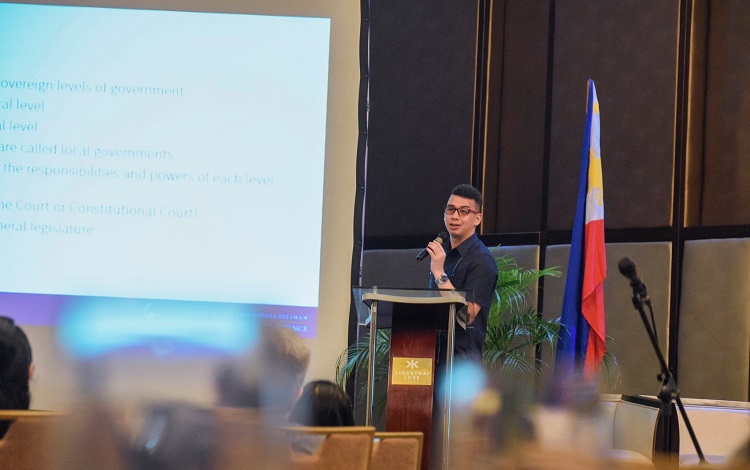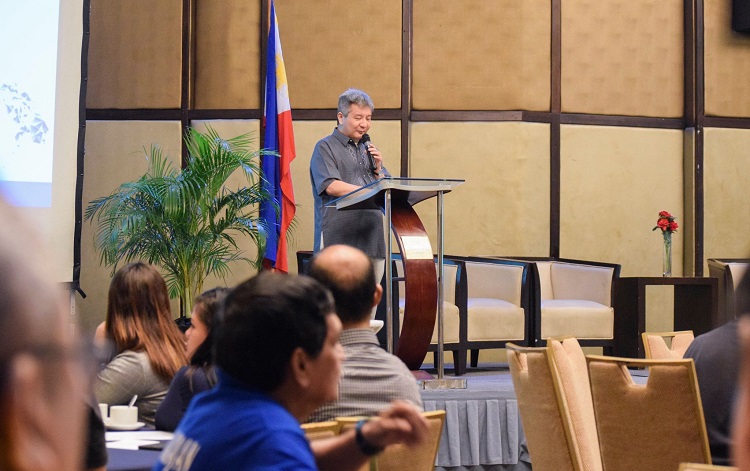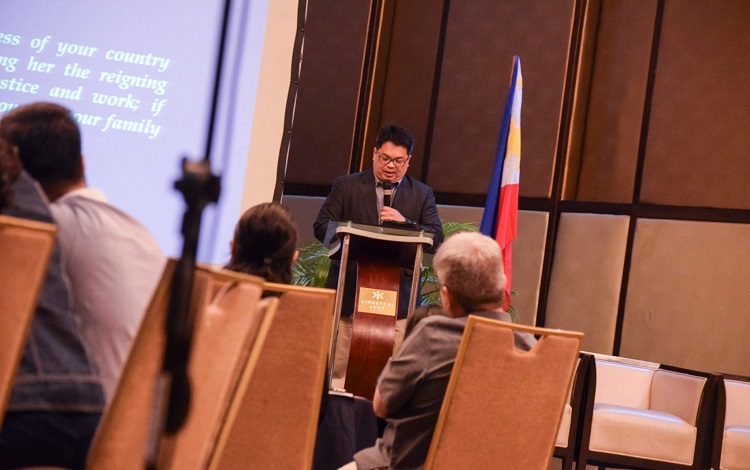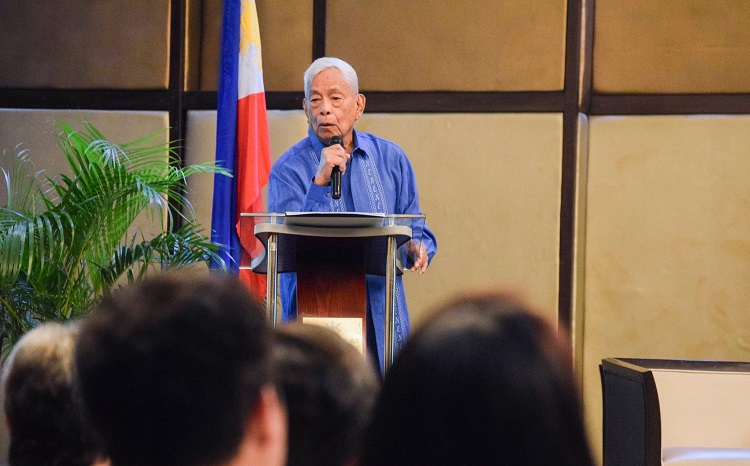
FORUM ON FEDERALISM. Jan Robert Go, assistant professor from UP Department of Political Science, warns that should we shift to a federal form of government the distribution of power has to be clear in the constitution and must outline the responsibilities. Photo courtesy of Hakim Palanggalan of The Crusader Publication.
CAGAYAN DE ORO CITY, Philippines — Experts in political science have encouraged the public to reflect if there is a real need for a shift to a federal form of government and to examine its advantages and disadvantages.
The most recent nationwide surveys of Social Weather Station (SWS) and Pulse Asia released in June 2018 showed that only 25% of Filipinos sufficiently understand our existing 1987 Philippine Constitution, while only 37% support the shift to federalism.
The surveys also showed that 64% are against charter change. "Changing the Constitution" also ranked last in the "most urgent national concerns" with only 3% of the Filipinos saying that it should be acted upon immediately.
In a forum in August, professors from Ateneo de Manila and the University of the Philippines - Diliman zeroed in on the political side of this proposition.
“Federalism is a system of government in which sovereignty is shared between central and peripheral levels,” began Jan Robert Go, assistant professor from UP Department of Political Science. “In the Philippines, however, this will be tricky for we are not sharing sovereignty. So how is the distribution of power and to what extent these powers are shared? The distribution of power has to be clear in the constitution, and must outline the responsibilities.”
At present, federalism, as a structure, governs over ⅓ of the world’s population.
“Each federal system is unique,” Go said. “It is hard to say which model we should adopt. Each federal system has a different set-up and a different distribution of power.”
Go illustrated how federalism is the “most customizable” form of government, factoring in geographical size, cultural diversity, delivery of social services, and democratic participation, among others.
“For example, Russia actually has a federal form of government, but because of their strong executive branch, it overshadows the federal form of their government,” he said.

DISCOURSE ON FEDERALISM. Xavier Ateneo president Fr Roberto "Bobby" C Yap SJ encourages everyone to have a healthy discourse on federalism and to examine seriously using evidence-based analysis the advantages and disadvantages of this shift to a new form of government. Photo courtesy of Hakim Palanggalan of The Crusader Publication.
Regionalization and decentralization
The draft charter, called "Bayanihan Federalism" by the Constitutional Committee (Con-Com), seeks a total of 18 federated regions: 16 regions that are symmetrical in character — including the Negros Island Region —and two regions that are asymmetrical in character, namely, the Bangsamoro and the Federated Region of the Cordilleras.
Each federated region will have its own regional government with executive, legislative, and judiciary branches. The regional government will oversee the local governments in the region.
A regional governor will head the regional government, supervise the local governments, appoint executive department and bureau heads, and formulate a Regional Expenditure Program. On the other hand, the regional deputy governor will preside over the regional assembly. The two will be elected as a team from within a regional assembly.
For each region to have a steady stream of revenues, a share of not less than 50% of all the collected taxes will be equally divided among them and automatically be released. The remaining 50% will go to the federal government.
To this, Go asked, “Would 50% be enough?” He added: "Decentralization intends to bring the government closer to the people, as it gives more power to the local governments. However, the present draft still resembles a unitary, centralized government, which is contrary to the goal of federalism.”

PEOPLE'S MOVEMENT. Ateneo de Manila’s Atty Michael Henry Ll Yusingco says that federalism should be a people's movement, not an initiative that is self-serving to a few. Photo courtesy of Hakim Palanggalan of The Crusader Publication.
‘Happiness in serving one’s country’
Ateneo de Manila’s Atty Michael Henry Ll Yusingco emphasized in his discussion that “if there should be a new constitution, we want it to be responsive to the people.”
He said: “The demand right now is to put the public in active consciousness and reflection if there really is a need for this shift. We are asked to reflect, and make the constitutional review strongly robust.”
Following the ideas of Apolinario Mabini, "the brain of the revolution," on “happiness in serving one’s country” (Constitutional Program of the Philippine Republic, circa 1898), Yusingco related Mabini’s vision of the functions and roles of the government towards the development of the country and its people.
He went on to say that “Charter change should not be an initiative for self-interest, nor an interest only of our politicians. We, the people at the local level, must assert to the government our right to be informed, to engage in and be part of the process. That is why when we talk about federalism, it has to be a people’s movement.”
On the other hand, former Senate President Aquilino “Nene” Pimentel Jr is hopeful that the Bayanihan Federalism will "help develop the country and solve peace and order issues, particularly in Mindanao."
He said, “We support [the Bayanihan Federalism] because of its merits, not because we support the president.”
Pimentel, who has been going around the country to promote federalism, shared that the current draft includes an equalization fund of 3% in the annual General Appropriations Act (for regions that might need financial assistance) and the self-executing anti-political dynasty provision.
However, he said that federalism will not solve everything right away. “Change is always evolutionary in a democratic society. ... This version is already a good way to start and the rest will follow.”

BAYANIHAN FEDERALISM. Former Senate President Aquilino “Nene” Pimentel Jr believes that the Bayanihan Federalism will "help develop the country and solve the peace and order issues, particularly in Mindanao." Photo courtesy of Hakim Palanggalan of The Crusader Publication.
Process and outcome
In July, academics and professionals across the Philippines expressed their “deep concern as regards the process of reviewing and possibly amending the Constitution.”
“We acknowledge the importance of discussing ways to improve governance in the country, particularly when it comes to a possible shift to a new, federal form of government. Some of us actually support federalism, while others oppose it. We have nevertheless united in this common statement to acknowledge the importance of evidence-based debate and discussion to root out the main benefits and costs of such a reform,” the statement read.
They believe the process must be much more participatory — including not just those who are for this reform, but also those who oppose it.
“International policy experience and evidence suggest that constitutional reforms are more effective if deliberations are front-loaded at the crafting stage, rather than belatedly appended once these reforms are already ratified,” they said.
“A constitution is supposed to bind our nation in common values and a shared vision. It is the very glue that should unite us all in common purpose. If we are to amend the constitution, we must invest not just in the outcome, but in the very process.”∎ (SJP)
“A Debate on Federal Philippines: Examining the Economic, Social, and Political Viability of Federalism in the Philippines” was held on August 17, 2018, at the Limketkai Luxe Hotel. The event was sponsored by the School of Government of the Ateneo de Manila University, Social Development Office of Xavier University - Ateneo de Cagayan, and Konrad-Adenauer-Stiftung Philippines.